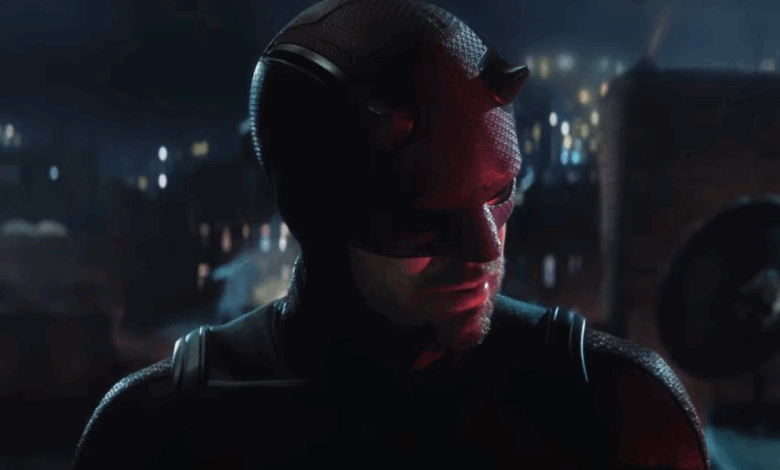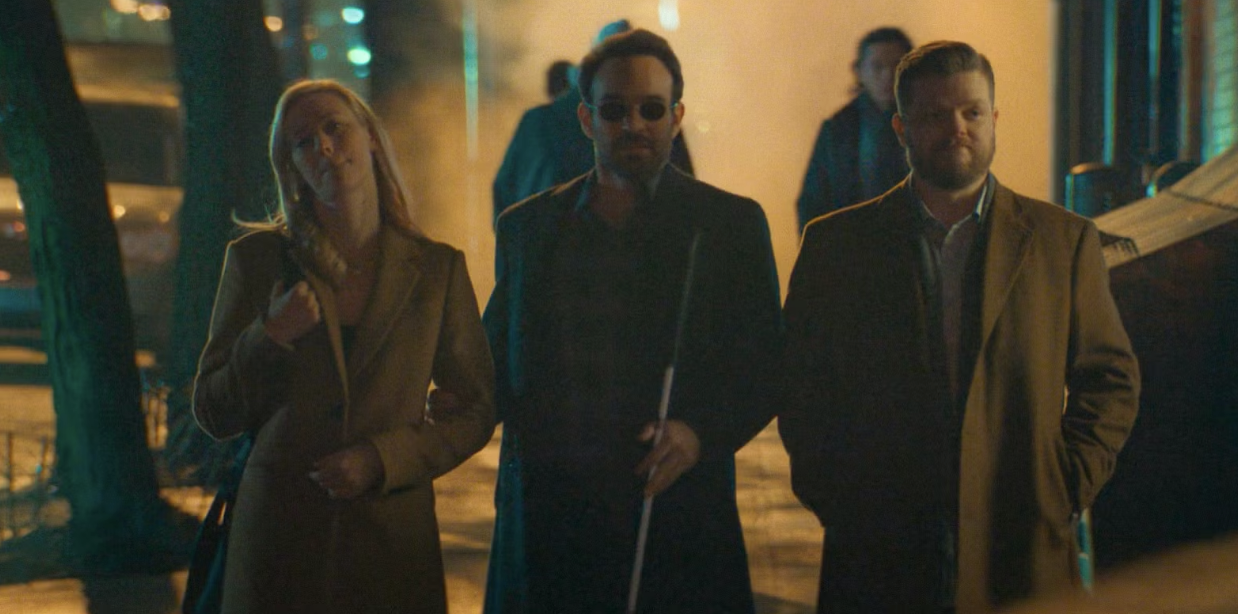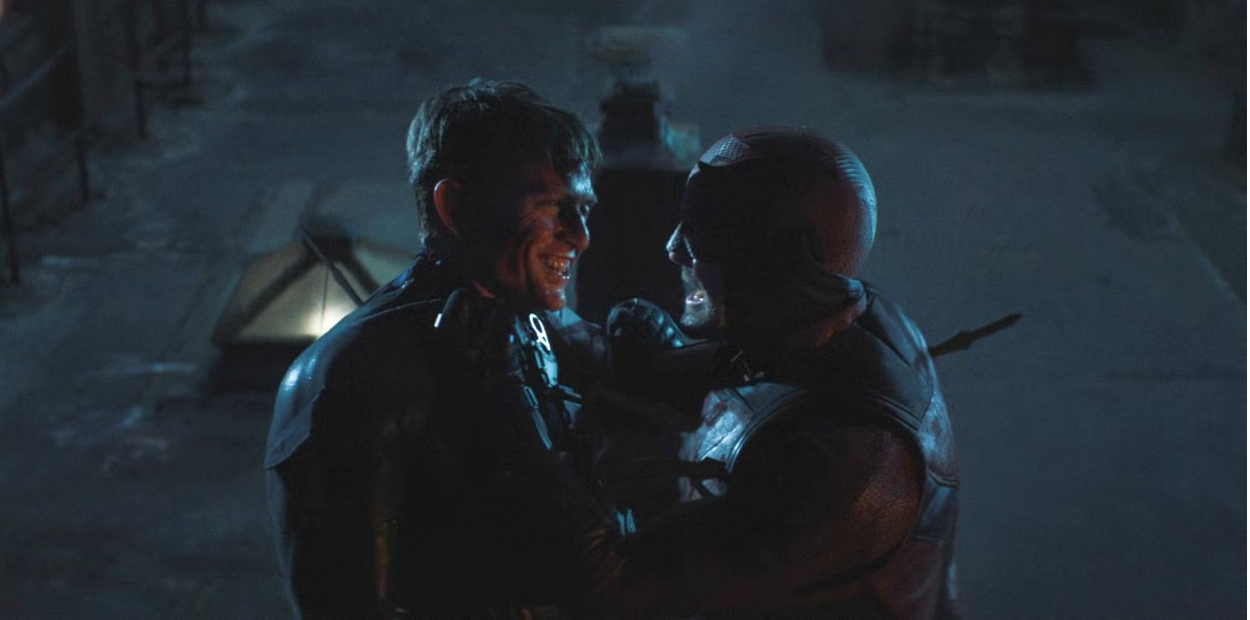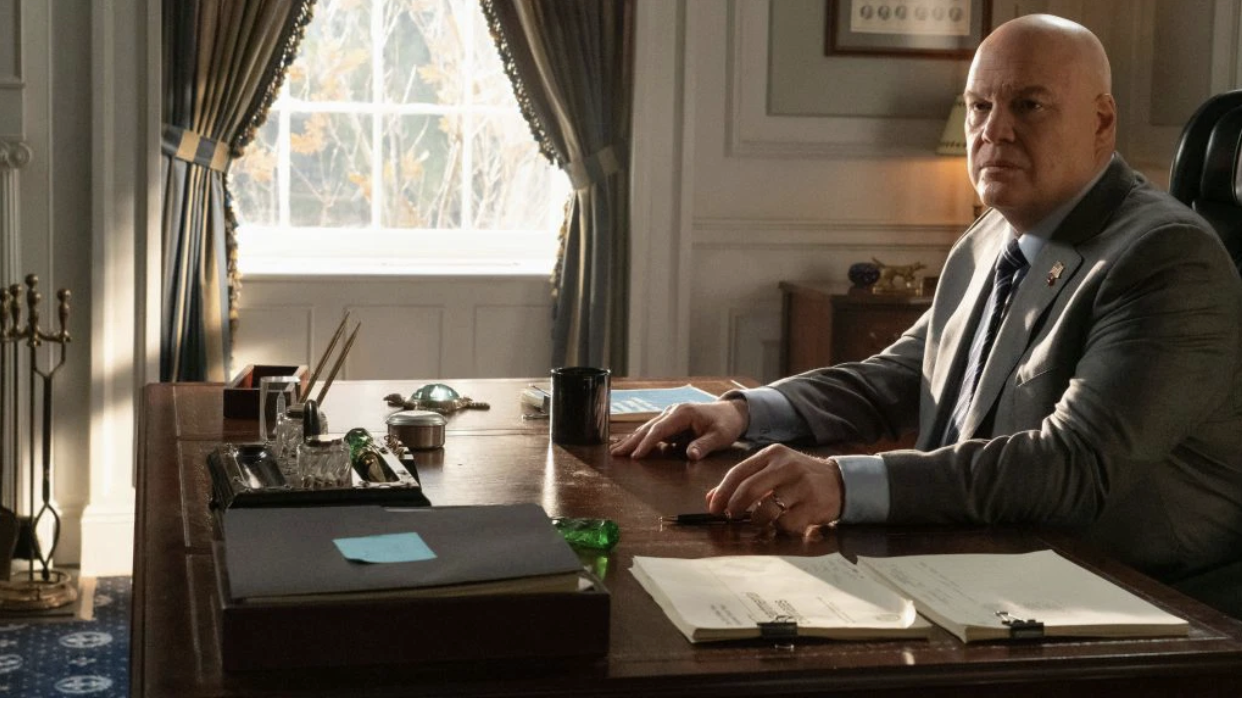Daredevil: Born Again Premiere – A Revival Stuck Between Two Visions
Putting time into relationships is a product of the original show that the new one wants to put behind it.

Christopher Fase ‘26 / Emertainment Monthly Staff Writer
It’s been nearly seven years since the third season and subsequent cancellation of Netflix’s Daredevil series. I was in my freshman year of high school at the time, and the announcement of the show’s cancellation felt uniquely crushing at the time. It was one of the first shows I had really grown personally attached to, both in terms of the characters but also as a developing fan of filmmaking and production. The infamous one-take fight scenes, brutal violence, and likeable cast thoroughly engrossed my younger self.. At a time when I was starting to sour on the Marvel Cinematic Universe as a cinematic project, Daredevil was the only thing that kept me genuinely excited, and its cancellation furthered my turn against the brand tenfold.
For a few years, the show’s characters have been in an odd state of limbo, unsure when or where they would appear again. In 2021 Vincent D’Onofrio’s Kingpin made a major appearance in the Hawkeye series and then Charlie Cox’s Matt Murdock made a brief cameo in Spider-Man: No Way Home, seemingly reaffirming the characters’ status as being canon to the MCU. Since then, the pair have made other brief appearances in series like She-Hulk and Echo, and at San Diego Comic Con in 2022, Marvel announced Daredevil: Born Again, which seemed like it would be a true return to the world of the original series and a proper return to focusing on Matt Murdock as a character.
However, the new series would not be without its own troubles, facing a major creative overhaul in 2023 as Marvel was rethinking their approach to television. After production had already been on pause due to the writer’s strike, Marvel Studios let go of the series’ head writers and a number of directors on the basis that the show simply was not working. It reportedly looked much more like a legal procedural than the original show, with Matt not showing up in his Daredevil costume until episode four. The first version also pushed away a lot of Matt’s supporting cast from the original show (put a pin in that). Through the overhaul, it seemed like Marvel was trying to reshape the series into something more reminiscent of the Netflix show – shortening the number of episodes, bringing back cast members who had been cut, and bringing in writers who had worked on the Punisher spin-off series – but does the series still work after having gone through this major shift?
The first episode opens with a simple sequence of Matthew Murdock (Charlie Cox), Karen Page (Deborah Ann Woll), and Foggy Nelson (Elden Henson) walking around New York and hanging out at Josie’s bar. These moments are essentially plotless, allowing us to catch up with the original show’s characters like they’re old friends of ours, and it’s refreshing to see the actors slip right back into these roles. The sequence also introduces a couple of new characters – Cherry (Clark Johnson), seemingly a friend of Murdock and crew who’s celebrating his retirement from the NYPD at the bar, and Kirsten Mcduffie (Nikki M. James), a lawyer who Foggy flirts with at the bar. Overall, it’s a nice moment that doesn’t last long – the drama quickly escalates as Foggy receives a phone call about a client in danger, which calls Matt to suit up as Daredevil once again. We’re pulled away from this comfortable moment with these old characters and pushed into the brutal reality that’s waiting for us: a CGI Daredevil swinging around a poorly lit digital city.

It’s ultimately a disappointing return for the Devil of Hell’s Kitchen. The music is trying to feel triumphant, but the whole image is off-putting, and often his swinging isn’t even visible due to the minimal lighting. He’s moving in ways that the Netflix Daredevil rarely had him moving, and when he did show off his acrobatic skills, those sequences often placed the camera at his level, following him as he ran through the city. With those sequences being shorter and the budget being lower, they had to emphasize individual acrobatic feats that he did. In this sequence, we’re watching him from a distance that makes us feel disconnected from what he’s doing, a distance that’s heightened by the dark and muddy lighting making it difficult to see what he’s even doing. The sequence immediately disconnects us from the original show and plants us exactly where Marvel is today – sloppy, rushed, and difficult to fully connect with.
From this point on, it becomes clear that the phone call was simply a diversion to get Matt to leave the bar. As he does, Benjamin “Bullseye” Poindexter (Wilson Bethel) makes his return and quickly disposes of his real target: Foggy Nelson, Matt’s legal partner since the start of the original show. I understand the attachment to his character that carries over from the original show for many fans, but this death just feels unearned for me. We haven’t had a chance to really reconnect with these characters or delve into how their lives have changed over the past seven years, and instead of giving us that chance, the show just rushes straight into his death. It seems as though his death is a carry-over from the pre-overhaul version of Born Again, in which he was apparently killed off-screen, which I think they sensed would have caused backlash. While this death is favorable to that, I think no version of the show that killed him this early would sit right with me, and this just feels like they’re trying to give people just enough time with him so that they won’t turn against the show outright. I guess it’s better than nothing, but not by much.
From that point on, Matt returns to the bar and has an explosive battle with Bullseye which takes the form of the new series’ first one-take fight scene, a staple of the original series. The fight has clearly been rehearsed to the nines, and Cox and Bethel are putting their all into their performances. However, the scene is let down by a lot of clearly digital effects that are not-so-gracefully implemented, namely the CGI fog that fills the space as the characters fight in the bar. Here, we see a tension between the stylings of the original series and modern Marvel’s production methods, leading to an inability for me to really engage with this series as though it’s basically Daredevil season 4. There’s clear talent on display here, but I can’t help but wonder about what this scene would look like in the original show’s hands.

After this opening, we cut to a year later and see that Matt’s quit being Daredevil. With Bullseye in prison and Karen Page having moved to San Francisco, Matt has started a new law firm with Kirsten Mcduffie, and she and Cherry (Clark Johnson), now a private investigator who knows that Matt is Daredevil, serve as Matt’s new supporting cast. While we don’t know too much more about them at this point, they’re doing an okay job giving Matt characters to bounce off of and work with, but they still have big shoes to fill replacing the beloved Foggy and Karen. A lot of this first episode ends up feeling like it’s in a rush, taking every opportunity to push us towards its new status quo. A good example of this is Wilson Fisk’s subplot, who goes very quickly from reuniting with his wife Vanessa (Ayelet Zurer) and considering politics to becoming mayor of New York at the end of the episode. I’m not saying the series needs to get super deep into the ins and outs of electoral politics, but the episode just has very little room to breathe because of how fast it’s moving towards this ending.
Given how much time is given to the opening sequence, it ends up feeling like the concept of taking things slow and putting time into relationships is a product of the original show that the new one wants to put behind it. There are deeper conversations that take place in the episode, but they’re all between pre-established characters such as Fisk, Matt, and Karen. While I love those characters and how those scenes play out, the new characters are robbed of a chance to shine, and it makes the episode feel embarrassed of anything new it’s bringing to the table, too comfortable relying on what people already know. I think a lot of this is the product of the overhaul, as the original version of Born Again would have pushed Foggy and Karen away off-screen, and therefore their scenes wouldn’t be up against the introductions for new characters that were shown in the first episode. I think comparisons would be inevitable among fans, but by essentially having to pit the new characters against the old, it just shows how much the new ones don’t stack up.
In the second episode, Born Again is given much more room to establish itself. The episode focuses on the character of Hector “White Tiger” Ayala (Kamar de los Reyes), aka White Tiger, a new addition to the cast who was largely left out of episode 1. When Hector is arrested for getting into a fight that ends in the death of a police officer, Matt is sympathetic to his plight and defends him despite Alaya being unable to afford him. At the same time, Fisk experiences the realities of his time as mayor, facing off with a police commissioner who’s resistant to his election due to his mob boss past while also dealing with how his absence from his criminal empire has affected his relationship to Vanessa. The episode is solid, and allows the new characters to shine with plots that weave them in naturally. With the focus on the legal side of Matt’s character, it feels a lot like what this show would’ve been without the overhaul in place. There’s still some flaws in the filmmaking, ending with a particularly choppily-edited fight scene, but that doesn’t feel worthwhile to complain about unless it becomes a recurring issue with the series.

Given how much of the show’s vision was changed mid-way through its production, one could argue it’s a miracle that any positives of the show are able to shine through at all. We’ve seen recently with the critical failure of last month’s Captain America: Brave New World how extensive corporate meddling can lead to a product that is ultimately visionless, providing nothing more than another log in the slowly-dying MCU fire. Daredevil: Born Again is not visionless, but its vision is limited. Limited by the rocky transition from the Netflix series to the new one, and by many of the same digital filmmaking fumbles that we’ve seen the Marvel pipeline produce as of late. From this premiere, the show clearly still has a lot of footing to find, but I’m more confident that it will have a chance to find that footing in later episodes and seasons than I was going into the show.